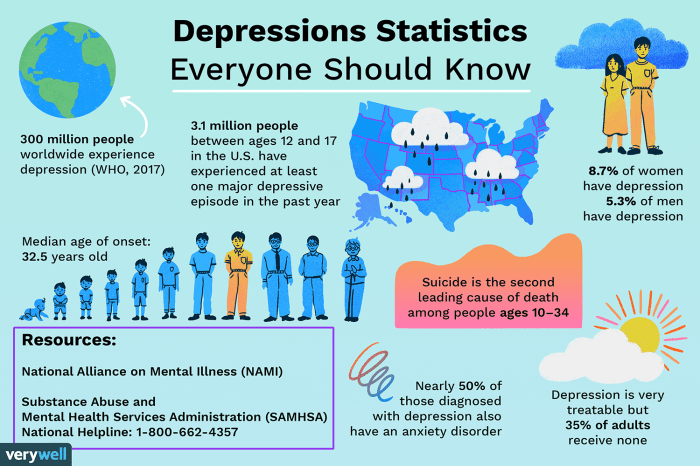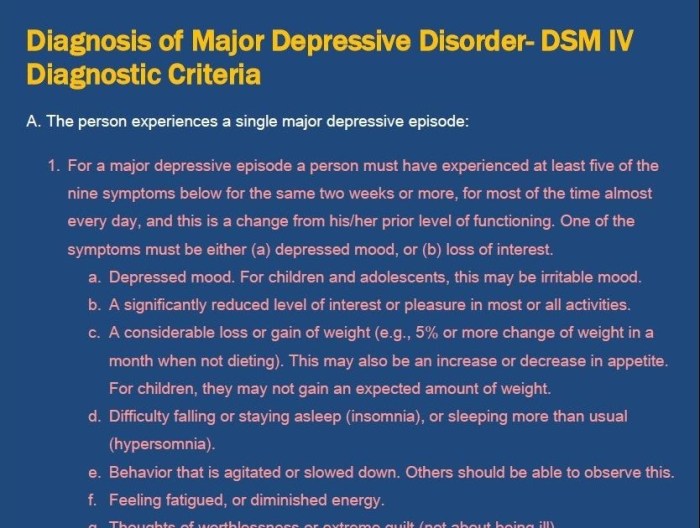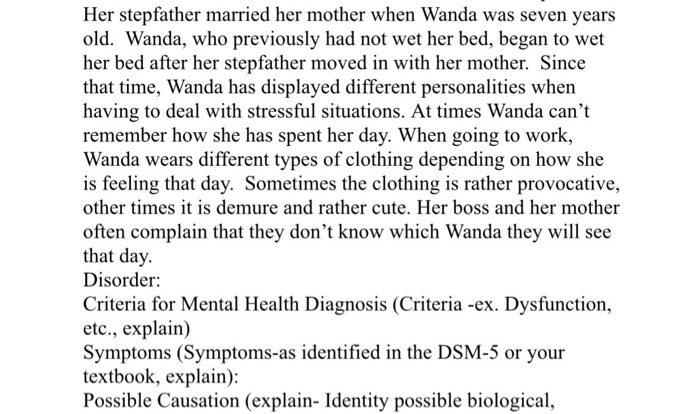Gabriella has been diagnosed with depressive disorder, a common mental health condition characterized by persistent sadness and loss of interest. This diagnosis marks the beginning of a transformative journey for Gabriella, one that requires understanding, support, and effective management strategies.
As we delve into Gabriella’s story, we will explore the complexities of depressive disorder, its symptoms, treatment options, coping mechanisms, and the path to recovery. Through this comprehensive examination, we aim to empower Gabriella and others facing similar challenges with knowledge, hope, and practical guidance.
Personal History and Background
Gabriella’s personal history reveals a complex interplay of factors that may have contributed to her diagnosis of depressive disorder. She grew up in a stable and supportive family, with no history of mental health issues. However, she experienced a traumatic event in her adolescence that significantly impacted her emotional well-being.
Gabriella’s support system includes her parents, siblings, and close friends. She has always been a high-achieving student and has excelled in her academic pursuits. However, she has also struggled with perfectionism and self-criticism, which have intensified in recent years.
Symptoms and Presentation

Gabriella meets the diagnostic criteria for major depressive disorder. Her symptoms have been present for over two weeks and include:
- Persistent sadness and low mood
- Loss of interest in activities she once enjoyed
- Changes in appetite and sleep patterns
- Difficulty concentrating and making decisions
- Fatigue and lack of energy
- Feelings of worthlessness and guilt
- Suicidal thoughts and ideation
These symptoms have significantly impaired Gabriella’s daily functioning. She has withdrawn from social activities, is struggling academically, and has difficulty fulfilling her responsibilities at work.
Treatment Options
There are several treatment options available for depressive disorder, including psychotherapy, medication, and lifestyle changes. Psychotherapy, such as cognitive-behavioral therapy (CBT), helps individuals identify and change negative thought patterns and behaviors that contribute to depression. Medication, such as antidepressants, can help regulate neurotransmitters in the brain that are involved in mood regulation.
Lifestyle changes, such as regular exercise, healthy sleep habits, and a balanced diet, can also play a significant role in managing depressive symptoms. It is important to adhere to treatment recommendations and seek support from family and friends during the recovery process.
Coping Mechanisms and Self-Care: Gabriella Has Been Diagnosed With Depressive Disorder

Gabriella can implement various coping mechanisms to manage her symptoms effectively. These include:
- Practicing relaxation techniques such as deep breathing exercises and meditation
- Engaging in regular physical activity
- Maintaining a healthy sleep schedule
- Eating a balanced and nutritious diet
- Connecting with support systems such as family, friends, and support groups
- Seeking professional help when needed
Self-care is essential for Gabriella’s well-being and recovery. By prioritizing her physical and emotional health, she can better manage her symptoms and improve her quality of life.
Prognosis and Recovery

The prognosis for individuals diagnosed with depressive disorder varies. With appropriate treatment and support, many people experience significant improvement in their symptoms and regain their functionality. However, it is important to note that depression is a recurrent disorder, and individuals may experience episodes of depression throughout their lives.
Ongoing monitoring and support are crucial to prevent relapse and promote long-term recovery. Gabriella should work closely with her healthcare provider to adjust her treatment plan as needed and monitor her progress. By adhering to treatment recommendations and engaging in self-care practices, she can increase her chances of a successful recovery.
FAQ Resource
What are the common symptoms of depressive disorder?
Symptoms may include persistent sadness, loss of interest, changes in sleep and appetite, difficulty concentrating, fatigue, feelings of worthlessness or guilt, and thoughts of self-harm.
What are the treatment options for depressive disorder?
Treatment options include psychotherapy, medication, and lifestyle changes. Psychotherapy focuses on changing negative thought patterns and behaviors, while medication can help regulate brain chemistry. Lifestyle changes, such as exercise, healthy sleep habits, and a balanced diet, can also support recovery.
How can I support someone with depressive disorder?
Provide emotional support, encourage professional help, listen without judgment, and help them engage in activities that bring them joy. Respect their boundaries and remind them that they are not alone.
